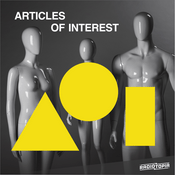108 episodes

Why AI Scaffolding Matters More than Use Cases ft Erika Flowers | Invisible Machines S6E12
31/12/2025 | 54 mins.
We’re in a moment when organizations are approaching agentic AI backwards, chasing flashy use cases instead of building the scaffolding that makes AI agents actually work at scale. Erika Flowers, who led NASA’s AI Readiness Initiative and has advised Meta, Google, Netflix, and Intuit, joins Robb and Josh for a frank and funny conversation about what's broken in enterprise AI adoption. She dismantles the myth of the "big sexy AI use case" and explains why most AI projects fail before they start. The trio makes the case that we're entering a post-software world, whether organizations are ready or not. Listen and learn why the scaffolding— or agent runtime — matters more than use cases, why organizational gaps kill AI projects, how to move projects from pilot to production, and what "post-software" actually means for enterprises.Check out Erika’s podcast, “Flower Power Hour”: https://open.spotify.com/show/15BTSl9fWiH3QTmVAYj6FdLearn more about Erika at www.helloerikaflowers.com/0:09 - NASA AI Readiness Explained | Erica Flowers on Agentic AI & Runtimes1:48 - Why the “Big Sexy AI Use Case” Is a Lie2:42 - AI Didn’t Start with ChatGPT: What NASA Has Been Doing for 30 Years4:24 - Why AI Runtimes Matter More Than Any Single Use Case5:21 - The Hidden AI Problem: Legacy Data, Silos & Organizational Reality7:13 - The Boring AI That Actually Works (And Why Enterprises Ignore It)8:10 - The AI Arms Race Nobody Understands9:22 - AI Scaffolding Explained: The Metaphor Every Leader Needs to Hear12:12 - AI Readiness Is Cultural Change, Not Just Technology14:38 - From Parking Lots to Companies: How Simple AI Agents Quietly Scale17:01 - Why Most AI Features Feel Useless in Real Products19:08 - Stop Automating Spreadsheets: Ask AI the Question Instead25:06 - The Post-Software Era: Why Designers Aren’t Enough Anymore28:33 - UI Is a Medium: How AI Will Absorb Interfaces Entirely46:24 - Infinite Content, Human Creativity, and the Future After AI---------- Support our show by supporting our sponsors!This episode is supported by OneReach.aiForged over a decade of R&D and proven in 10,000+ deployments, OneReach.ai’s GSX is the first complete AI agent runtime environment (circa 2019) — a hardened AI agent architecture for enterprise control and scale. Backed by UC Berkeley, recognized by Gartner, and trusted across highly regulated industries, including healthcare, finance, government and telecommunications.A complete system for accelerating AI adoption - design, train, test, deploy, monitor, and orchestrate neurosymbolic applications (agents). Use any AI modelsBuild and deploy intelligent agents fastCreate guardrails for organizational alignmentEnterprise-grade security and governanceRequest free prototype: https://onereach.ai/prototype/?utm_source=soundcloud&utm_medium=social&utm_campaign=podcast_s6e12&utm_content=1 ---------- The revised and significantly updated second edition of our bestselling book about succeeding with AI agents, Age of Invisible Machines, is available everywhere: Amazon — https://bit.ly/4hwX0a5#InvisibleMachines #Podcast #TechPodcast#AIPodcast#AI #AgenticAI#AIAgents#DigitalTransformation#AIReadiness #AIDeployment#AISoftware#AITransformation#AIAdoption#AIProjects#NASA#AgentRuntime#Innovation#AIUseCase

5 Predictions for Agentic AI in 2026 | Invisible Machines Podcast S6E11
17/12/2025 | 53 mins.
As 2025 draws to a close, Robb and Josh look back on some of the conversations they had this year both on the podcast and advising major enterprises and government leaders to offer their predictions for agentic AI in 2026. With major disruptive forces like outbound AI in the hands of consumers and agent runtime environments allowing organizations to create scalable infrastructure for AI agents, next year could see seismic changes in the way investors look at companies, and the ways companies look at themselves. Featuring a look at the components of an agent runtime, as well as previews of upcoming episodes with returning guest Ben Goertzel of SingularityNET and Joshua Gans, co-author of Prediction Machines, this episode is required viewing for anyone charged with finding ROI with agentic AI. 00:00 – Introduction to 2026 Agentic AI Predictions01:12 – Outbound AI Arrives02:30 – Scaling vs. Inventing AI04:55 – Ben Goertzel Preview06:45 – Scrappy Innovation in AI08:20 – Invisible Work Explained10:00 – Agents Job-Hunting for You11:15 – Bottom-Up AI Adoption13:10 – Layoffs, Knowledge Loss & AI15:00 – The “Fake AI Expert” Problem16:25 – Why Runtimes Matter18:00 – What IDWs Actually Do20:00 – Canonical Knowledge for Agents28:20 – Invisible Work Demo37:10 – Simulation Becomes the Next Frontier---------- Support our show by supporting our sponsors!This episode is supported by OneReach.aiForged over a decade and proven in 10,000+ deployments, OneReach.ai’s GSX is the first complete AI agent runtime environment (circa 2019) — a hardened AI agent architecture for enterprise control and scale. Backed by UC Berkeley, recognized by Gartner, and trusted across highly regulated industries, including healthcare, finance, government and telecommunications.A complete system for accelerating AI adoption - design, train, test, deploy, monitor, and orchestrate neurosymbolic applications (agents). Use any AI modelsBuild and deploy intelligent agents fastCreate guardrails for organizational alignmentEnterprise-grade security and governanceRequest free prototype:https://onereach.ai/prototype/?utm_source=soundcloud&utm_medium=social&utm_campaign=podcast_s6e11&utm_content=1 ---------- The revised and significantly updated second edition of our bestselling book about succeeding with AI agents, Age of Invisible Machines, is available everywhere: Amazon — https://bit.ly/4hwX0a5#InvisibleMachines #Podcast #TechPodcast#AIPodcast#AI #AgenticAI#AIAgents#DigitalTransformation#AI2026#2026Predictions#ArtificialIntelligence#FutureOfWork#AITrends#AIRuntime#IntelligentDigitalWorkers#AIInvestment#EnterprisAI#AIStrategy#AIROIStrategy#AITransformation#InvisibleMachines#AIRuntime

Marc Hijink, author of Focus: The ASML Way | Invisible Machines Podcast
28/11/2025 | 1h 6 mins.
How did a Dutch company most people haven’t heard of come to hold the fate of AI? Marc Hijink, author of Focus — The ASML Way joins Josh and Robb to explore the insatiably precise process of producing the chips that power GPUs, and with them the AI taking shape all around us. Marc is a financial reporter and technology columnist for the Dutch daily newspaper NRC, and Focus is the result of decades of uncompromising, embedded reporting on ASML, which produces 90% of all chips worldwide. Operating out of a quiet town in the Netherlands, their extreme ultraviolet (EUV) lithography machines produce a steady stream of chips working with an accuracy of within a few atoms. The trio explores how the EUV process is as much probabilistic as it is deterministic, as well as the impact that different cultures have on ASML’s partnerships and pipeline. Relying on lenses that have to be grown from crystals, lithography is a high-stakes endeavor that requires a delicate balance of tooling and advanced engineering. We need it to power everything from smartphones to washing machines to traffic lights. With China looking for inroads into this foundational technology that has been controlled by the western world, this conversation is as timely as it is fascinating.Chapters -00:00 - Inside ASML01:12 - How ASML Makes the World’s Chips03:20 - Chip Supply Chain Fragility04:55 - Marc Hijink’s ASML Reporting07:00 - The Hidden Hardware Layer08:20 - Chips & Geopolitics11:00 - Chips Are Physical Matter12:40 - Error Correction & Precision14:30 - ASML x TSMC Partnership16:45 - ASML’s Chaos Culture19:40 - Dutch vs. German Engineering28:20 - Moore’s Law Goes 3D32:10 - ASML + Mistral AI40:00 - Why ASML Can’t Be Copied49:00 - How ASML Prioritizes Orders55:10 - Agentic AI & Complexity1:02:00 - Humans Adapting to AI---------- Support our show by supporting our sponsors!This episode is supported by OneReach.ai — creators of Generative Studio X (GSX), the first complete AI Agent Runtime Environment (V1 circa 2019). Forged over a decade of R&D and proven in 10,000+ deployments, GSX lets enterprises design, build, and orchestrate secure, scalable AI agents and systems. Trusted across healthcare, finance, government, and telecom. Use any AI modelsBuild and deploy intelligent agents fastCreate guardrails for organizational alignmentEnterprise-grade security and governanceAvoid vendor lock-in.Backed by UC Berkeley and recognized by Gartner.Before you build or buy another AI solution, think about getting an AI system.Book a Demo: https://onereach.ai/book-a-demo/?utm_source=soundcloud&utm_medium=social&utm_campaign=podcast_s6e9&utm_content=1 ---------- The revised and significantly updated second edition of our bestselling book about succeeding with AI agents, Age of Invisible Machines, is available everywhere: Amazon — https://bit.ly/4hwX0a5#InvisibleMachines #Podcast #TechPodcast#AIPodcast#AI #AgenticAI#AIAgents#DigitalTransformation#Cybersecurity#AIInfrastructure#AIOrchestration#AIManagement#TechLeadership#Innovation#ResponsibleAI#AIStandards#OpenAI#Technology

Siloed Security? Forget AI Adoption
16/11/2025 | 55 mins.
Omar Santos is a Distinguished Engineer directing AI Security at Cisco. He’s here for a frank conversation about the realities of security in the agentic era. As more software is created on-the-fly by AI agents at the request of humans, security has to become an ever-present layer. Security will be built into complete agent runtime environments and will require constant human oversight and intervention, augmented by the ability to simulate outcomes to avoid risk. Omar is also the Co-Chair of the Coalition for Secure AI, and these are the things he’s thinking about on a daily basis. He sits down with Robb and Josh at the end of a travel blitz that included work surrounding OpenAI’s Stargate Project, a four-year $500b plan for new AI infrastructure in the United States. The trio discuss how the ongoing training of models and the rising demand for inference continue to push the demand for security across burgeoning technology ecosystems. ---------- Support our show by supporting our sponsors!This episode is supported by OneReach.ai — creators of Generative Studio X (GSX), the first complete AI Agent Runtime Environment (V1 circa 2019). Forged over a decade of R&D and proven in 10,000+ deployments, GSX lets enterprises design, build, and orchestrate secure, scalable AI agents and systems. Trusted across healthcare, finance, government, and telecom. Use any AI modelsBuild and deploy intelligent agents fastCreate guardrails for organizational alignmentEnterprise-grade security and governanceAvoid vendor lock-in.Backed by UC Berkeley and recognized by Gartner.Before you build or buy another AI solution, think about getting an AI system.Book a Demo: https://onereach.ai/book-a-demo/?utm_source=soundcloud&utm_medium=social&utm_campaign=podcast_s6e9&utm_content=1 ---------- The revised and significantly updated second edition of our bestselling book about succeeding with AI agents, Age of Invisible Machines, is available everywhere: Amazon — https://bit.ly/4hwX0a5Chapters - 00:00 - Intro and episode setup00:33 - Meet Omar Santos and his role in AI security01:00 - Security as the new programming02:20 - Coalition for Secure AI and security as a new language04:45 - Identity, access, and AI agents06:09 - Scaling models and mega data centers09:04 - Training vs inference and the compute explosion12:54 - Budgets, compute, and hybrid human–AI security teams15:16 - Checklists, guardrails, and spec-driven development20:00 - From IDEs to agent swarms and background agents25:19 - CodeGuard, rules for coding agents, and secure SDLC32:00 - Why doing nothing is the biggest AI security risk39:30 - Validating AI, AI safety levels, and open source dilemmas46:00 - Private networks, insider AI agents, and embedded security51:00 - Simulation, digital twins, and business-wide risk modeling#InvisibleMachines #Podcast #TechPodcast#AIPodcast#AI #AgenticAI#AIAgents#DigitalTransformation#Cybersecurity#AIInfrastructure#AIOrchestration#AIManagement#TechLeadership#Innovation#ResponsibleAI#AIStandards#Cisco#OpenAI#StargateProject#AISecurity#Technology

Confronting Complexity with GraphQL ft Matt DeBergalis CEO/Co-founder, Apollo GraphQL | S6E8
31/10/2025 | 52 mins.
As the CEO and Co-founder of Apollo GraphQL, Matt DeBergalis has a lot to say about the ways that organizations can confront their inherent complexity and build reliable systems for AI to flourish. He joins Robb and Josh to talk about how GraphQL has made it easier for developers to build meaningful, AI-powered solutions.As an open-source language for APIs, GraphQL makes data fetching more precise and flexible. When utilized within an agent runtime environment, GraphQL gives organizations the ability to build their own tools. As Matt explains, this gives orgs an enormous edge with agentic AI, and helping teams move light on their feet, experiment, and adjust quickly.The trio also reminisces about the early days of the internet and agrees that ChatGPT was the mother of all demos.Looking for the Agent runtime episode - https://youtu.be/CddjTUWSaHA?si=86dSwjyE3uZGYY8FHere is recent news Apollo announced at Summit last week :https://www.apollographql.com/newsroom/press-releases/apollo-expands-platform-to-power-the-agentic-future-at-graphql-summit-2025Chapters - 00:00 - Intro and episode setup02:10 - Unsung hero moment for GraphQL and agent energy03:12 - GraphQL basics for APIs in an agent runtime04:36 - Why GraphQL won - types, tooling, developer velocity05:20 - API design UX - REST vs GraphQL for developers06:54 - From developers to builders - laypeople using agents07:00 - Will the term developer fade - future of dev work12:28 - Edit over scratch - tools that elevate product taste15:35 - Personalized small-batch software and 3D-print analogy17:31 - Agent-personalized apps beyond siloed UIs18:46 - GraphQL as business language - nouns, verbs, capabilities29:04 - Deterministic rails vs non-deterministic models in finance32:01 - Real guardrails with MCP to Agent to GraphQL51:00 - Graph as backbone of agentic AI ---------- Support our show by supporting our sponsors!This episode is supported by OneReach.ai - creators of GSX, the first complete AI Agent Runtime Environment (V1 circa 2019).Forged over a decade of R&D and proven in 10,000+ deployments, GSX lets enterprises design, build, and orchestrate secure, scalable AI agents and systems. Trusted across healthcare, finance, government, and telecom.Use any AI modelsBuild and deploy intelligent agents fastCreate guardrails for organizational alignmentEnterprise-grade security and governanceAvoid vendor lock-inBacked by UC Berkeley and recognized by Gartner.Before you build or buy another AI solution, think about getting an AI system.Book a Demo: https://onereach.ai/book-a-demo/?utm_source=soundcloud&utm_medium=social&utm_campaign=podcast_s6e6&utm_content=1--------------------> The revised and significantly updated second edition of our bestselling book about successful adoption of AI agents, Age of Invisible Machines, is now available anywhere you buy your books:Amazon — https://bit.ly/4hwX0a5#invisiblemachines#podcast #techpodcast #aipodcast #ai #agenticai #digitaltransformation #graphql #opensource #softwareengineering #techinnovation #digitaltransformation #futureofai #emergingtech #developertools #techtalk #MCP#ApolloGraphQL
More Arts podcasts
Trending Arts podcasts
About Invisible Machines podcast by UX Magazine
Listen to Invisible Machines podcast by UX Magazine, This Life of Mine with James Corden and many other podcasts from around the world with the radio.net app

Get the free radio.net app
- Stations and podcasts to bookmark
- Stream via Wi-Fi or Bluetooth
- Supports Carplay & Android Auto
- Many other app features
Get the free radio.net app
- Stations and podcasts to bookmark
- Stream via Wi-Fi or Bluetooth
- Supports Carplay & Android Auto
- Many other app features


Invisible Machines podcast by UX Magazine
download the app,
start listening.



































